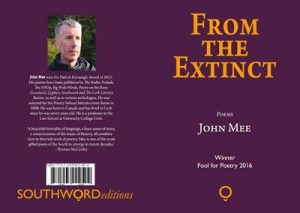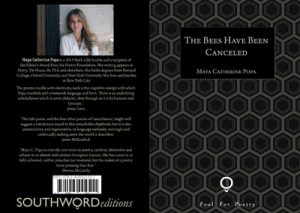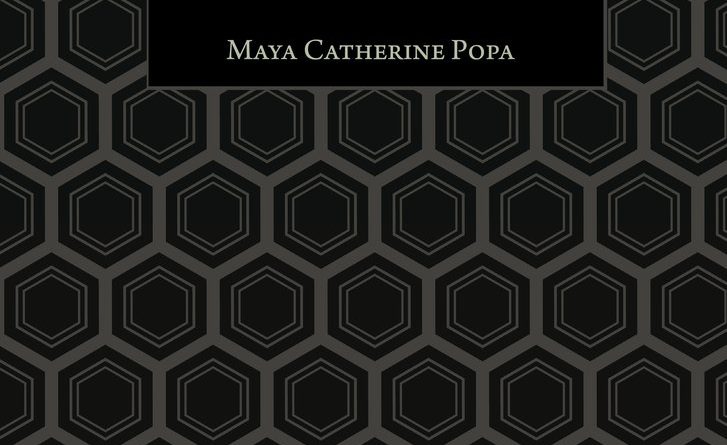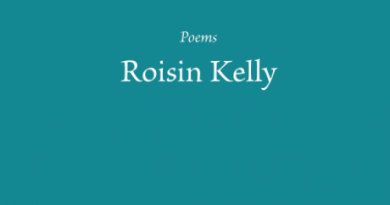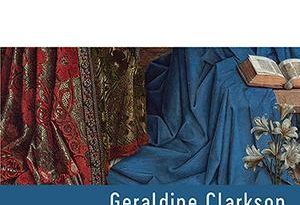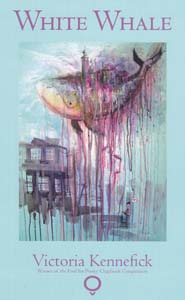From the Extinct by John Mee & The Bees Have Been Canceled by Maya Catherine Popa
– Reviewed by Cian Murphy –
Popa’s background spans the Atlantic: she has published in Ireland, the UK, and the US, and one can hear this in her voice. Her language is American (note the absent “u” in -our words and “l” in cancelled), and travel recurs throughout her work. If distance marks Popa’s poems, then time is the prime marker in Mee’s. In his other life (one in which he taught this reviewer), Mee writes about the laws of property and trusts. These are fields in which the scholar must mine jurisprudence to discover new seams of inquiry. The same could be said of the Irish lyrical poetic tradition in which Extinct fits. This is clear from the opening poem, ‘Paperweight’, in which “other men’s songs” weigh on the hearts of “the Gaelic poets”. The debt is one the poet will, slowly, pay forward, through “a few new lines / at the bitter end”.
Mee’s centrepiece is a sequence, ‘My Father, His Father’, at the heart of which is a sestina, ‘My Father’s Eyes’, set around a visit to an opthalmologist. In this poem, Mee demonstrates strong technical ability with his form, even as he plays with it (“light” / “sunlight” / “delight”). A more difficult question is whether the poem carries off the repetitive form’s somewhat onerous burden. The sestina may, as in Elizabeth Bishop’s work, evoke claustrophobia. Here it echoes the repetitions of behaviour that play out between father and son. The form is “on point”, as another of Mee’s characters might say, but that does not necessarily justify its use. The emotional heft of Mee’s writing is more easily carried in ‘The Wrong Man’, ‘Listen to Your Father’, and in ‘Orphan’, each of which is progressively more sparse in language.
Elsewhere, there is a playfulness in his work. In ‘Zoonoses’, the poet’s body-swap with his cat sees him “pissing in the garden”. In ‘Gerl’ the harshness of teenage culture – “Fuck You… YOUR LIFE IS SHIT” – sits alongside a near-transcendent moment in which a stamp with the symbol of John the Evangelist is held “up to the light”. In ‘Travel Light’, Mee toys with both language and sentiment in the context of suitcase packing. All told, there is more range in From the Extinct than in many full collections. The pamphlet’s title affords a link to the work of Mee’s fellow prize-winner. Both works address climate change in several of their poems: Mee’s animals send postcards to (soon-to-be-extinct?) humans, and in ‘Expat’, a goldfish “mouths Help from plastic bags”.
However, it is in Popa’s pamphlet that politics is front and centre. Her title poem is one of four to carry the “… Been Canceled” form. Another refers to “Government”. However, the poems do not preach a common gospel. If “the return to nature” has been cancelled, so too has “the end of the world”. We are left to persist in a rather interminable and anxious present.
Nowhere does this play out with greater power than in ‘Is This Your Bag Please Would You Open It?’ In that poem, an awkward exchange with an airport security guard leads to the closing line: “is this your privacy and can he keep it?”. The split lines throughout the poem force an irregular scan and heighten the impact of the intrusion. The empty space in the middle of the poem is uneven, and uneasy, our vulnerability in an airport’s interstitial space of the airport writ onto the page.
Other conceits do not fly quite so high. ‘Wandmaker’ haunts as a response to the Boston bombing. However, although the poem grips fast in the middle, the return to the artisan of the title in the final lines somehow loosens that grasp. The identity or role of the wandmaker remains unclear – although perhaps that is the point after all.
